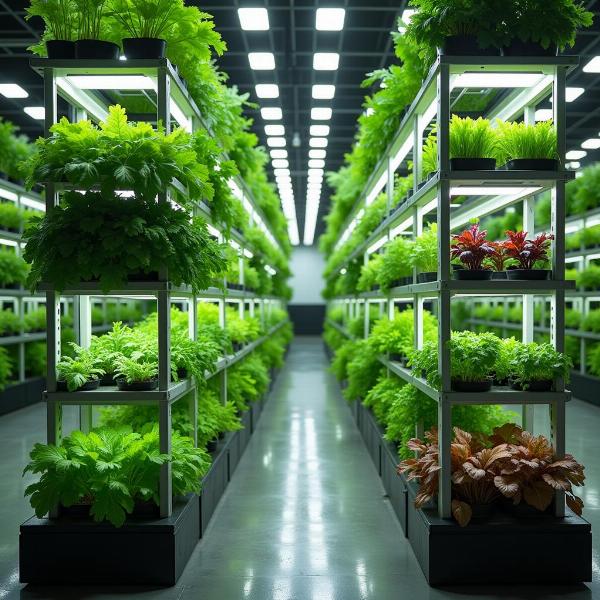Olericulture, a term often encountered in agricultural contexts, might leave some Hindi speakers wondering about its exact meaning and significance. Understanding “olericulture meaning in Hindi” is crucial for anyone involved in farming, gardening, or simply interested in expanding their knowledge of agricultural practices. This article will delve deep into the meaning of olericulture, its various aspects, and its importance in the Indian context.
What is Olericulture? (ओलेरीकल्चर क्या है?)
Olericulture, in its simplest form, refers to the science and practice of growing vegetables. It encompasses everything from selecting the right seeds to harvesting and storing the produce. In Hindi, olericulture is often referred to as “शाक-सब्जी उत्पादन” (shaak-sabzi utpadan), which literally translates to vegetable production. However, the term “ओलेरीकल्चर” (olericulture) is also widely understood and used, especially in technical and academic circles. Olericulture plays a vital role in ensuring food security and providing nutritional value to our diets.
Branches of Olericulture (ओलेरीकल्चर की शाखाएँ)
Olericulture is a broad field with several specialized branches, each focusing on specific aspects of vegetable production. These include:
- Vegetable Breeding (सब्जी प्रजनन): This branch focuses on developing new vegetable varieties with improved characteristics like higher yield, disease resistance, and better nutritional value.
- Vegetable Nutrition (सब्जी पोषण): Understanding the nutritional needs of different vegetables is crucial for optimizing growth and yield. This branch deals with the application of fertilizers and other nutrients to ensure healthy plant development.
- Vegetable Protection (सब्जी संरक्षण): Protecting vegetable crops from pests and diseases is essential for successful olericulture. This branch involves using various methods, including pesticides, biocontrol agents, and cultural practices.
- Post-Harvest Technology (कटाई के बाद की तकनीक): This branch focuses on preserving the quality and extending the shelf life of harvested vegetables through proper handling, storage, and processing techniques.
Importance of Olericulture in India (भारत में ओलेरीकल्चर का महत्व)
India is the second-largest producer of vegetables globally, highlighting the significance of olericulture in the country’s agricultural landscape. Olericulture contributes significantly to the Indian economy by providing employment opportunities, particularly in rural areas. Moreover, it plays a crucial role in ensuring food security and providing essential nutrients to the population.
How is Olericulture Different from Horticulture? (ओलेरीकल्चर हॉर्टिकल्चर से कैसे अलग है?)
While both olericulture and horticulture deal with plant cultivation, olericulture specifically focuses on vegetables, whereas horticulture encompasses a wider range of crops, including fruits, flowers, and ornamental plants. Horticulture is the broader term, and olericulture can be considered a specialized branch within it.
Future of Olericulture (ओलेरीकल्चर का भविष्य)
With the growing global population and increasing demand for fresh produce, the future of olericulture holds immense potential. Innovations in technology, such as precision farming and vertical farming, are transforming the way vegetables are grown, leading to higher yields and improved efficiency.
 Vertical Farming Technology
Vertical Farming Technology
Conclusion
Olericulture, or “शाक-सब्जी उत्पादन,” is a vital part of India’s agricultural sector, ensuring food security and providing nutritional value to our diets. Understanding its various aspects, from vegetable breeding to post-harvest technology, is crucial for anyone involved in vegetable production. With advancements in technology and growing global demand, olericulture is poised for continued growth and innovation in the years to come.
FAQ
- What is the meaning of olericulture in simple terms? Olericulture is the science and practice of growing vegetables.
- What is the Hindi word for olericulture? While “ओलेरीकल्चर” (olericulture) is commonly used, “शाक-सब्जी उत्पादन” (shaak-sabzi utpadan) is a more direct Hindi translation.
- Why is olericulture important? Olericulture is crucial for food security, providing nutrition, and generating employment.
- What are the different branches of olericulture? Key branches include vegetable breeding, nutrition, protection, and post-harvest technology.
- How is olericulture different from horticulture? Olericulture focuses specifically on vegetables, while horticulture encompasses a broader range of crops, including fruits, flowers, and ornamentals.
Meaning-Hindi.in: Your Expert in Hindi Translation
Meaning-Hindi.in provides professional translation services from Hindi to various languages and vice-versa. Our expert team specializes in business, legal, technical, website, educational, and specialized translations. We also offer fast and urgent translation services to meet your specific needs. Whether you need help with commercial documents, legal contracts, or technical manuals, Meaning-Hindi.in can provide accurate and culturally sensitive translations. Contact us today at [email protected] or call us at +91 11-4502-7584 to learn more about how Meaning-Hindi.in can assist you with your translation needs.